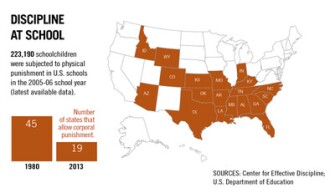UPDATED
A bill filed in Kansas would allow teachers and parent-authorized caregivers to give harder spankings to children than are currently allowed under the state’s law.
The bill comes as child welfare advocates push for the elimination of corporal punishment in schools.
The Kansas proposal would add this definition of corporal punishment to state law, which currently allows for spanking without leaving marks:
'Corporal punishment' means up to ten forceful applications in succession of a bare, open-hand palm against the clothed buttocks of a child and any such reasonable physical force on the child as may be necessary to hold, restrain or control the child in the course of maintaining authority over the child, acknowledging that redness or bruising may occur on the tender skin of a child as a result. As used in this subsection "child" includes a person over the age of 18 who is enrolled in high school."
The bill would allow such punishment by parents, step parents, legal custodians, and people with written authorization from parents, such as school personnel.
The bill’s supporters are quoted in a story from KCTV in Kansas City as saying the measure will “restore parental rights” and clarify what forms of spanking aren’t legally allowed by providing a clear limit for acceptable corporal punishment.
But opponents say corporal punishment can be harmful to children and ineffective as a means of discipline. The KCTV story quotes nurse practitioner Amy Terrero, a child abuse expert at Children’s Mercy Hospital:
Twenty, 30 years ago, we didn't sit in car seats, and we do now. So maybe they did spank or were spanked as a child, but now we have research that shows it is less effective than time out. It tends to lead to more aggressive behavior with a child."
The bill, introduced Friday, had not been taken up by a House committee Tuesday.
FEB. 19 UPDATE: The chair of the Kansas House Corrections and Juvenile Justice Committee has told multiple media outlets that he doesn’t think the committee will consider the bill. Democratic state representative Gail Finney, who introduced the bill, said in a statement on her website that the measure was designed to clarify the boundaries of acceptable corporal punishment, which is not expressly defined in current Kansas statutes.
The lack of an unambiguous statutory definition of parental corporal discipline has led to the inconsistent application of administrative child in need of care (CINC) enforcement and criminal charges, allowing some clear instances of child abuse to go un-prosecuted and un-abated and other clear instances of parental corporal discipline to result in administration officials removing children from the home and/or criminal charges against parents. This legislation only seeks a consistent application of parental corporal discipline across all of Kansas'105 counties."
As this October Education Week story shows, 19 states allow corporal punishment in schools, each relying on their own policies to dictate what is allowed.

